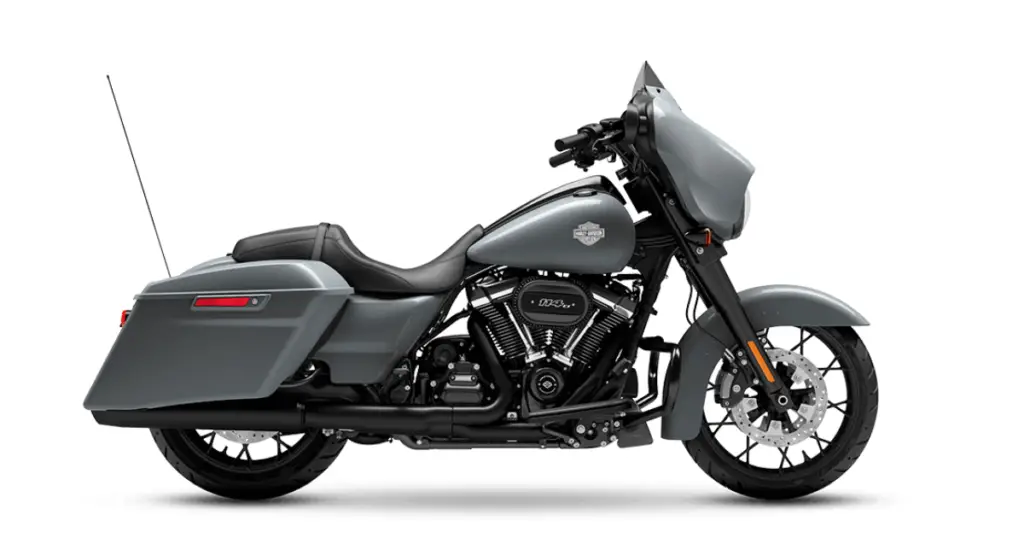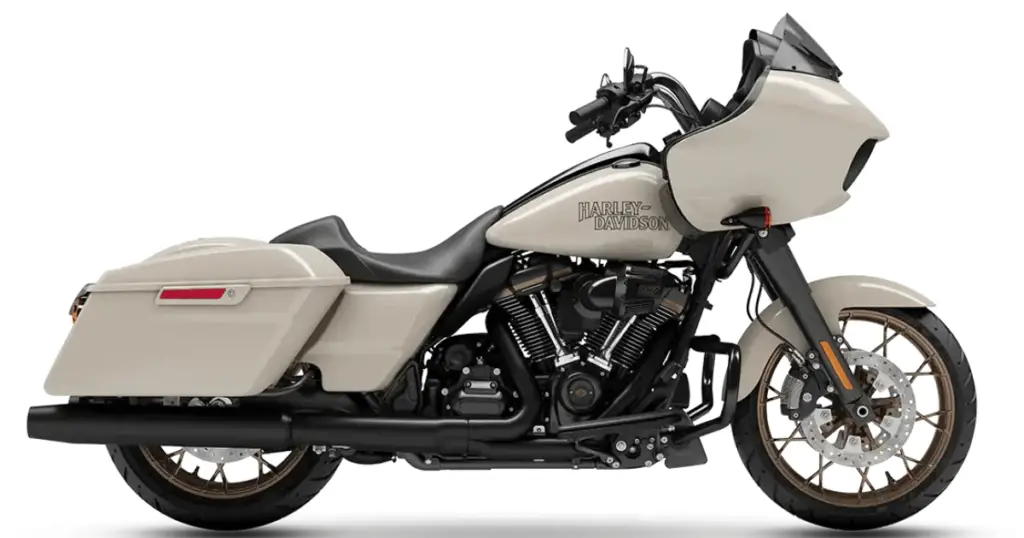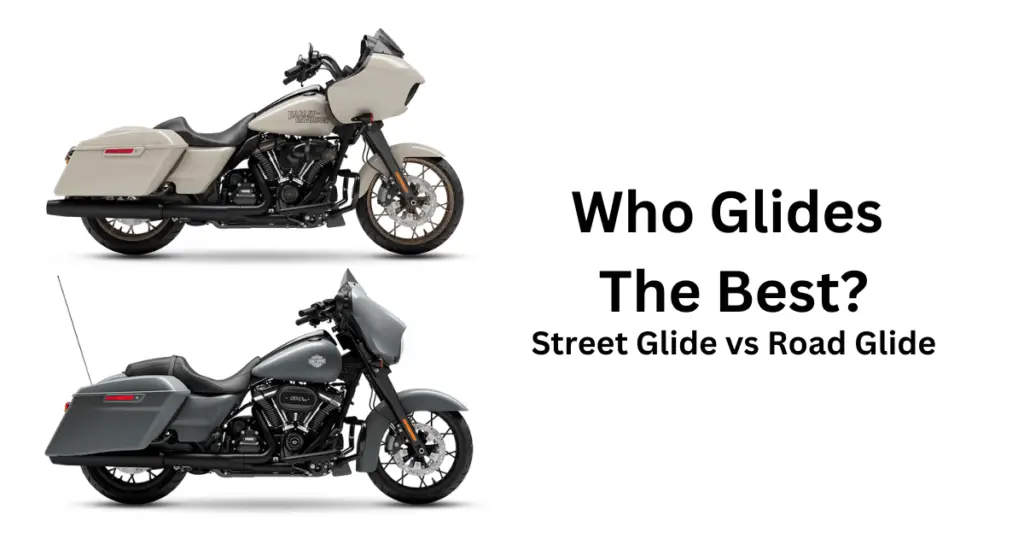The legendary Harley-Davidson lineup has always been a source of fascination for riders, with its highly diverse and distinctive motorcycle offerings. Two of the most popular and iconic models in the Harley-Davidson Touring lineup are the Street Glide and the Road Glide.
Both are renowned for their distinctive styling, powerful performance, and unrivaled comfort. But when it comes down to the Street Glide vs Road Glide, which one glides the best? Let’s dive in and find out.
Related reads:
– I Found The Best Harley For Tall Riders (No, Really)
– The Search for The Best Harley For Big Guys: Concluded
– I Found The Best Harley-Davidson for Short Riders (Really)
Do I Have A Personal Preference Between Bikes?
As an experienced motorcycle enthusiast, I must admit that both the Street Glide and Road Glide are exceptional motorcycles that cater to the specific needs of different riders. Each has its own unique charm and set of features that make them stand out in their own ways. Therefore, it’s challenging to have a clear personal preference.
However, I am going to provide an unbiased comparison to help you figure out which bike might be the best fit for you.
Another Road Glide comparison:
– Road Glide vs Road King: What’s The Best Touring Choice?
Which Bike Is More Popular?
The popularity of a bike often depends on various factors like design, features, performance, and so on. Both the Street Glide and Road Glide have a solid fan base due to their remarkable features.
The Street Glide, with its classic “batwing” fairing and fork-mounted design, has charmed many bikers who love a traditional and intuitive layout. On the other hand, the Road Glide, with its aggressive and aerodynamic “shark nose” fairing, attracts those who prefer a more modern and distinctively styled motorcycle.
How Do They Stack Up?
Before we delve into a detailed comparison, let’s have a brief overview of both bikes.
Street Glide Full Overview

Introduced in 2006, the Harley-Davidson Street Glide has quickly become a favorite among the brand’s enthusiasts. This bike features a classic “batwing” fairing mounted on the forks, offering traditional and intuitive handling. It is powered by the Milwaukee-Eight 107 engine, producing a whopping 111 ft-lbs of torque.
This bike is ideal for those who appreciate a traditional design with modern features.
Related:
> Road King vs Street Glide
> Street Glide Years to Avoid
Check out this 360 walkaround of a 2020 Street Glide:
[su_youtube_advanced url=”https://www.youtube.com/watch?v=uQ94Tc-ay3Q” title=”video detailing a 360 degree walk around of a 2021 harley davidson street glide”]
While you’re here: 4 Best Shocks for Street Glide Touring Models Gets Revealed
Road Glide Full Overview

The Road Glide, with its aggressive “shark nose” fairing mounted on the frame, offers a more aerodynamic design. This fairing design helps reduce rider fatigue by channeling the wind resistance to the frame instead of the handlebars. Like the Street Glide, it also shares the powerful Milwaukee-Eight 107 engine.
Read next: Road Glide Years to Avoid
It’s also worth noting that the Road Glide is a perfect choice for riders who prefer a modern design with superior wind protection and thorough aftermarket support:
> A Guide to the Best Road Glide LED Headlight Upgrade
> Here Are The Most Comfortable Road Glide Handlebars (Review)
> Update: I Found The Best Road Glide Windshield Upgrade!
> Search for the Most Comfortable Road Glide Seat Is Complete!
To keep things moving, here’s a walkaround of a 2021 Road Glide:
[su_youtube_advanced url=”https://www.youtube.com/watch?v=aTRxCyP26Ic” title=”video detailing a 360 degree walk around of a 2021 harley davidson road glide”]
Street Glide vs Road Glide: A Direct Comparison

Let’s compare these two iconic motorcycles head-to-head to see how they stack up against each other.
Other Model Comparisons:
> Electra Glide vs Street Glide
> Road King vs Electra Glide
Street Glide vs Road Glide Handling Review
The most significant difference between the Street Glide and Road Glide lies in their fairing design and how it affects handling. The Street Glide’s fork-mounted “batwing” fairing offers more traditional handling.
On the other hand, the Road Glide’s frame-mounted fairing provides a smoother, more stable ride at higher speeds, reducing rider fatigue.
Performance Comparison
In terms of performance, both bikes are powered by the same Milwaukee-Eight 107 engine, delivering a massive 111 ft-lbs of torque. This means both bikes offer similar acceleration and power output.
However, due to its lighter weight, the Street Glide might offer slightly better acceleration.
Considering Their Ground Clearance and Curb Weight
The Road Glide stands slightly taller with a ground clearance of 5.5 inches compared to the Street Glide’s 5.3 inches. This difference, while subtle, affects the bike’s ability to navigate uneven terrain. In terms of weight, the Street Glide is lighter at 829 pounds, against the Road Glide’s 855 pounds. This lighter weight contributes to the Street Glide’s slightly nimbler handling and better acceleration.
Trail Angle and Lean Angle for Each
The trail angle, which affects the bike’s steering and stability, is slightly different between the two models. The Road Glide has a trail angle of 6.8 inches, while the Street Glide’s is 6.7 inches. These measurements influence the handling characteristics, with the Road Glide offering a bit more stability in straight lines and the Street Glide providing a marginally more responsive steering feel.
The lean angle also varies, with the Road Glide offering 31°/29° (left/right) and the Street Glide at 29°/31°. This difference is crucial for riders who enjoy taking corners and navigating through winding roads. The Street Glide’s lean angle allows for a slightly more aggressive cornering posture.
Suspension and Braking Comparative Analysis
Both the Street Glide and Road Glide are equipped with 49 mm Dual Bending Valve forks offering 4.6 inches of travel and Premium Low Hand-Adjustable Suspension with 2.1 inches of travel at the rear. This setup provides a smooth and responsive riding experience, absorbing road imperfections effectively.
The braking system in both models consists of dual 300 mm floating rotors with 32mm four-piston fixed calipers at the front and a 300mm fixed rotor with a 32mm four-piston fixed rotor at the rear, ensuring reliable and responsive braking performance.
Price Comparison
Both the Street Glide and Road Glide come with a similar price tag, reflecting their similar features and specifications. However, the final cost may vary depending on optional upgrades and customizations.
How Reliable Are They?
Harley-Davidson bikes are well-known for their durability and reliability, and both the Street Glide and Road Glide are no exceptions. Both models are built with high-quality materials and components, ensuring they can withstand the rigors of long-distance touring.
Related Articles:
>Harley 107 Problems
> Harley 103 vs 107
Which Is Faster?
As both bikes are powered by the same engine, their top speed and acceleration are virtually identical. Both are capable of hitting highway speeds in a matter of seconds.
Related: Harley 107 vs 114 vs 117: A Milwaukee Bound Shootout
Which Is Better For Touring?
Both the Street Glide and Road Glide are designed for long-distance touring. However, the Road Glide’s frame-mounted fairing and more spacious riding position might give it an edge when it comes to comfort on long rides. But, let’s dive into the details a little bit:
Considering Wind Buffeting and Highway Stability
One of the most discussed aspects among riders is wind buffeting. The Road Glide, with its frame-mounted ‘Shark Nose’ fairing, offers superior wind deflection. This design channels air resistance to the frame, significantly reducing the stress on the rider’s arms, a boon during long highway stretches. In contrast, the Street Glide’s fork-mounted ‘Batwing’ fairing, while iconic, can transfer more wind pressure to the handlebars, leading to more noticeable buffeting, especially at higher speeds or behind large vehicles like tractor-trailers.
Riding In Different Weather Conditions
Both models handle admirably in various weather conditions, but the Road Glide’s aerodynamic fairing gives it an edge in crosswinds and turbulent conditions. The Street Glide, being slightly lighter, offers a bit more agility, which can be advantageous in urban settings or in stop-and-go traffic. However, in windy conditions, riders of the Street Glide might find themselves working a bit harder to maintain stability.
Which Is Better For Long Haul Riding?
For long-distance touring, rider comfort is paramount. The Road Glide’s spacious layout between the handlebar and the seat is often preferred by taller riders. Its design allows for a more stretched-out posture, reducing rider fatigue. The Street Glide, while comfortable, offers a slightly more compact riding position, which some riders find less conducive to long hours in the saddle.
What Are The Intended Uses for Each Model?
While both models are designed for touring, the Street Glide’s traditional design and intuitive handling make it a great choice for city riding and short trips. On the other hand, the Road Glide, with its aerodynamic design and superior wind protection, is ideal for highway cruising and long-distance touring.
Read next: Road Glide Problems
How To Decide Which Is Right For You
Choosing between the Street Glide and Road Glide ultimately comes down to personal preference. Consider your riding style, comfort preference, aesthetic taste, and the type of riding you plan to do. Test riding both models can also help you make a more informed decision.
Read next: How Long Do Harleys Last?
For a visual review, check out the below head-to-head:
[su_youtube_advanced url=”https://www.youtube.com/watch?v=_OysAsGGj8Q” title=”video comparing Harley Davidson Street Glide vs. Road Glide”]
FAQs
What are the main differences between Street Glide and Road Glide?
Is The Street Glide or Road Glide More Comfortable For Long Rides?
Are there any differences in engine performance between The Street Glide and Road Glide?
How does the weight of the Street Glide compare to the Road Glide?
Does The Street Glide or Road Glide Have Better Resale Value?
What are the price differences between Street Glide and Road Glide?
In conclusion, both the Street Glide and Road Glide are excellent choices for those in search of a reliable and comfortable touring motorcycle. Each has its own unique features and advantages that make them stand out.
The best way to choose between them is to consider your personal preferences and riding needs.
Continue Reading:
> Harley Davidson Engine Rebuild Cost: How Much?
> Forward Controls vs Mid Controls: A Direct Comparison
> Harley Stage 2 Upgrade Cost: Is It Worth It?